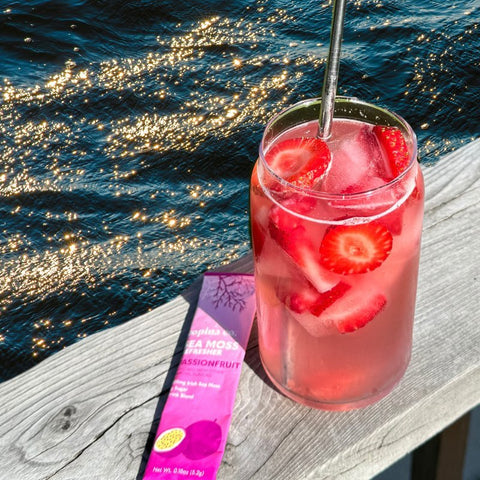You’ve probably heard the word collagen tossed around before as something great for healthy hair, skin, and nails– but have you ever asked when you should start using the supplement? We want to help you find out when you should start adding collagen into your diet. No matter your age of 25 or 65, collagen can help you in a variety of ways.
Everybody is different which means that even people at the same age can have their collagen levels differ greatly due to their varying levels of stress, diet, and other factors such as genetics that they experience on a daily basis. This topic is not one-size-fits-all in the sense that we can definitively tell you the best time for everybody to start supplementing their collagen production.
What we can tell you is what is overarchingly known about the body’s collagen production with age through past research. Our bodies’ rate of collagen production begins to slow down over time, typically around the age of 25. Overall, collagen loss happens due to the natural age cycle we experience but can be sped up due to external and internal stressors or habits.
Overall, our bodies usually begin to produce less collagen in our 20s. Many people say that you begin to see signs of aging in your 30s or 40s, but often they can be seen through the 20s due to lifestyle choices or genetics. See, collagen is an essential protein in the body, making up around 30% and 75% of the protein in your skin. When you enter your middle to late 20s that amount of collagen begins to decline and people going through menopause lose a significant amount of collagen in the first 5 years.
Collagen is an essential part of our body’s natural chemical structure. Collagen loss can be linked to dull hair, loss of vibrancy in the skin, decreased skin hydration, weak nails, and signs of premature aging.
How much Collagen am I losing?
Around the age of 25 is when most people’s natural collagen production begins to slow down. At the age that you go through menopause is when collagen production really begins to diminish. There are also lifestyle choices that can affect the body’s production of collagen that can affect an individual.
Signs of Collagen deficiency
Since all bodies are different due to a number of reasons, sometimes it is better to look at collagen deficiencies than to put an exact age you should begin supplementing.
Some signs your body might be producing less collagen can be:
- Joint pain
Some joint pains can occur due to a result of collagen deficiency that happens as you age. Collagen helps aid the cartilage in your joints which is where the connection lies. The wearing down of cartilage is also connected to age or high-performance athletes. The pain can result in inflamed joints.
- Decreased mobility in your joints
Having stiff joints might go hand-in-hand with your joint pain but sometimes it also occurs on its own. Collagen helps aid in the elasticity of cartilage so when there is not as much collagen and the cartilage begins to deteriorate and stiffen it can result in loss of motion in joints.
- Decreased skin elasticity
Less collagen can also mean your skin loses elasticity and fullness. This is shown when your cheeks or eyes appear more hollow. This can also be shown through the skin feeling “thinner” which is when it wrinkles easier.
How do collagen supplements work?
Supplementing for collagen production can occur in a variety of ways. You can supplement through powders, vitamins, or lifestyle changes. We recently covered 8 ways for you to easily boost your collagen naturally on our blog. We cover different ways to boost your collagen like sleep support, stress management, and different foods that can help boost your internal collagen support. A lot of foods help boost your internal collagen that is plant-based.
We also know some chose to supplement their collagen intake with different types of powders. What makes collagen supports like Copina Co’s so important is that they actually support your body’s own natural collagen production.* That means your body can make more collagen on its own instead of getting it from animal products.* If you aren’t sure if you want to use an animal source or a plant-derived source, take a look at our blog about the difference between Vegan Collagen Supports and Animal-Based collagen to find out what is right for you and your lifestyle.
With Copina Co. beauty blends we both fight collagen degradation in the body and support collagen production. This is important because if you begin supplementing our ingredients help support your loss of collagen while increasing your natural production within the body. This means we help make up for what you lost while also working towards keeping your collagen production at a high operating level. Also, vegan collagen supports help address some of the underlying reasons why your body might be making less collagen, like through diet habits.
So… When should I start supplementing?
At Copina Co. we always want to take a holistic approach when it comes to your health. This being said, we are not your doctors and we do not know your own personal health background.
Using a collagen booster like Copina Co.’s is helpful at any age and is never too late to start. The benefits of taking a collagen booster vs. collagen peptides are also minorly different. If you want to look into which might be right for you, check out our blog on the differences. When formulated well, vegan collagen support products can effectively counteract some of the negative effects of collagen loss for strong and healthy skin, nails, hair, and joints.
Overall– you can start taking collagen supplements at any age, but the earlier you start in the process the longer the compound benefits will be over time. Our collagen due to its vegan and holistic origins is easier on the environment than an animal-based alternative. Either way, everybody reacts differently to collagen supports and it is important to look into your product before taking it.
We think of collagen support supplementation as a lifestyle choice. Choosing to do things that will naturally aid collagen production as young as possible will help keep your joints, skin, hair, and nails healthy longer.*
If you want to help collagen production from the minute it begins losing pace in your body, you might want to begin supporting it in your mid to late 20s. If you are nervous about beginning a new supplement, feel free to check in with your doctor to see what they think.
In the meantime, take a look at our ingredient list and how it can benefit your collagen production, and also check out how much collagen you should be taking per day if you choose to start supplementing.
If you are looking for ways to get a daily dose of collagen boost in your diet, try our creamer blends in your morning coffee or use our Cacao Calm Plant-Based Collagen Boost Drink Blend + ashwagandha blend for a great nightly ritual.
Want to learn more about our Collagen Boost Powders and their ingredients? Check out these three blogs:













